Project Management Practices Report: Case Study Analysis
VerifiedAdded on 2022/08/24
|40
|11463
|28
Report
AI Summary
This report delves into project management practices, focusing on schedule, quality, and risk management. It begins with a literature review of key project knowledge areas and then presents three case studies: a lecture capture upgrade project, the Sydney Opera House construction, and the exploitation of foreign workers. Each case study includes problem descriptions, methodologies, analyses, findings, and recommendations. The report concludes with a synthesis of results, findings, and recommendations, aiming to provide insights and strategies for enhancing project management effectiveness and avoiding common pitfalls. The report is designed to provide practical guidance for project managers and students, offering valuable lessons learned from real-world scenarios.
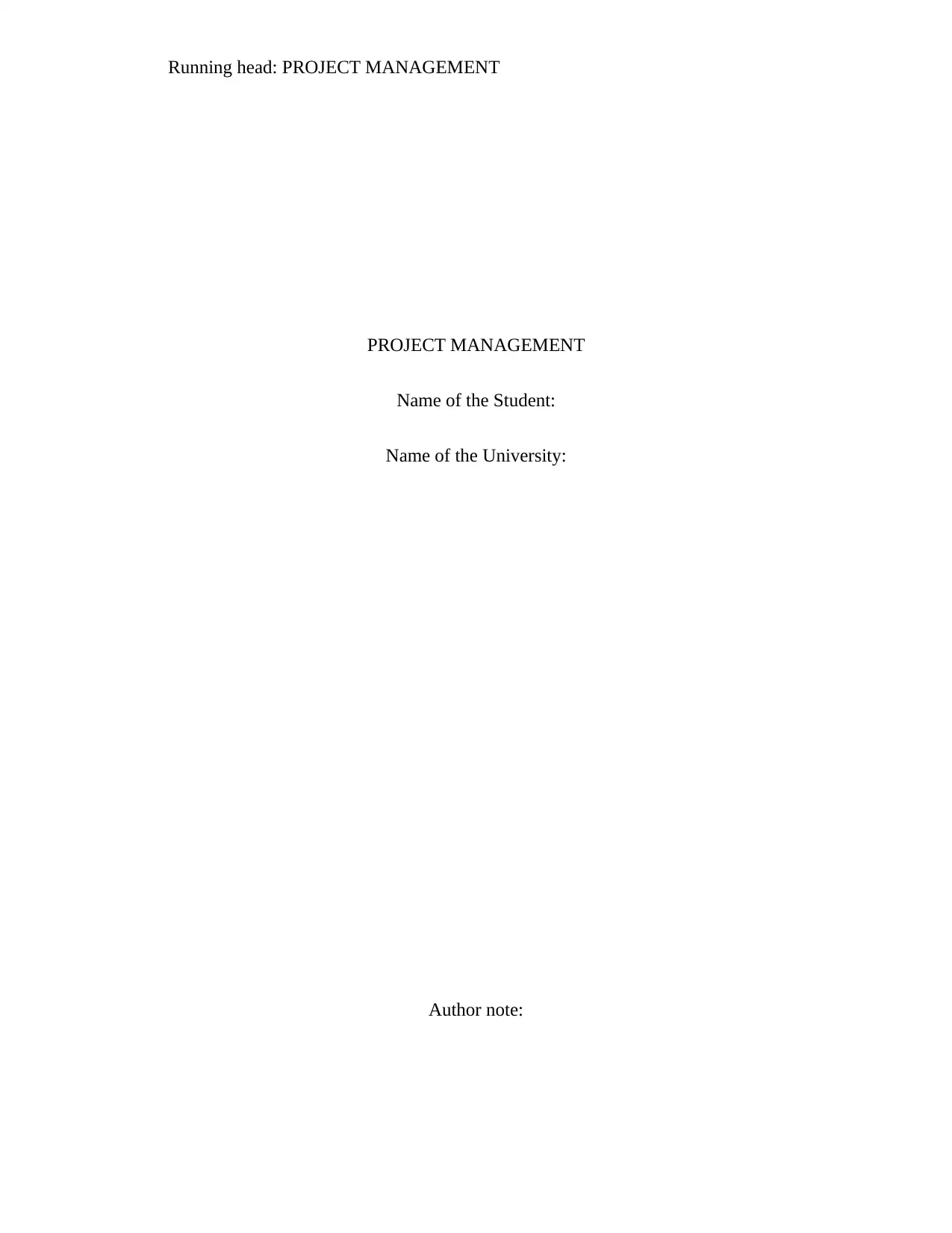
Running head: PROJECT MANAGEMENT
PROJECT MANAGEMENT
Name of the Student:
Name of the University:
Author note:
PROJECT MANAGEMENT
Name of the Student:
Name of the University:
Author note:
Paraphrase This Document
Need a fresh take? Get an instant paraphrase of this document with our AI Paraphraser
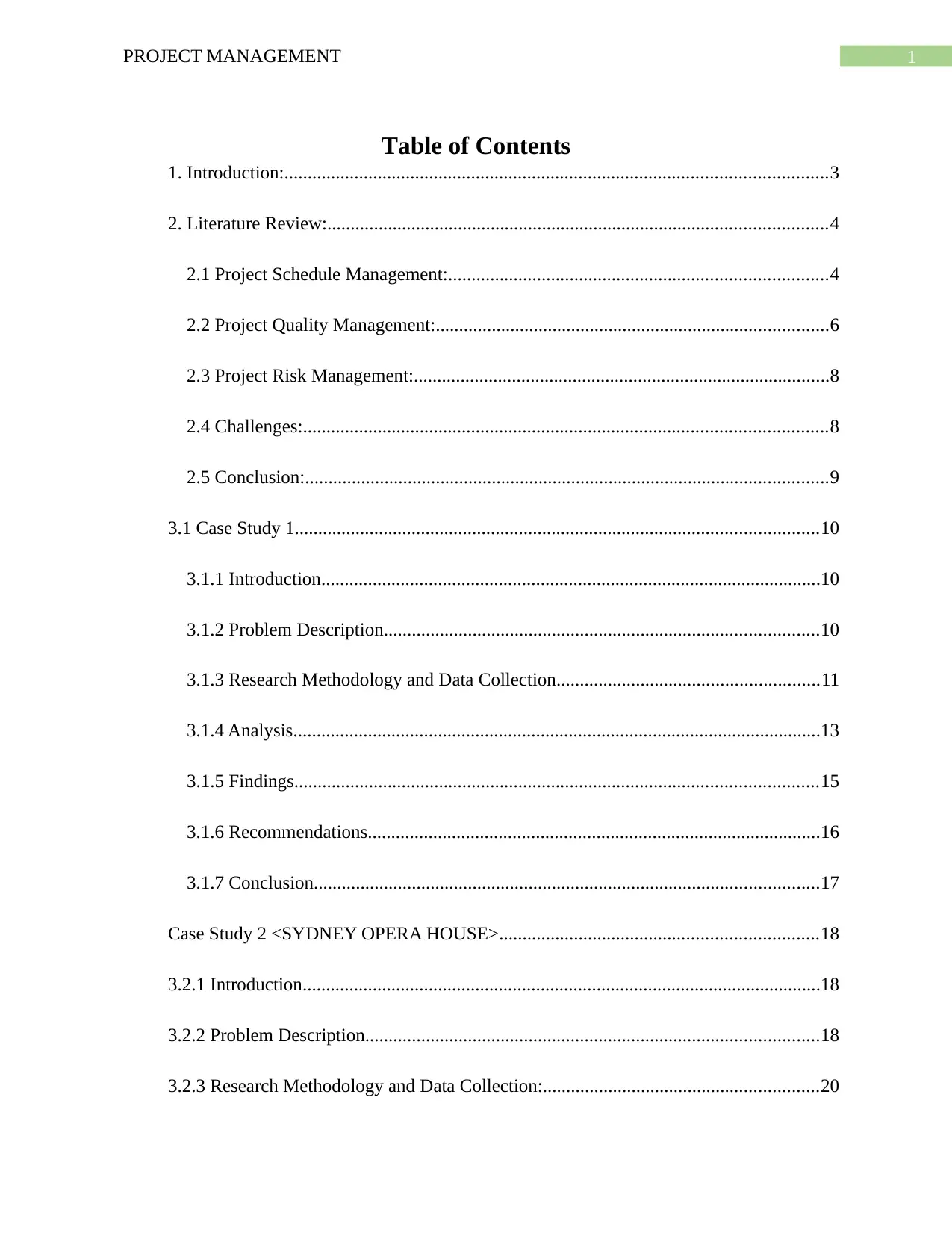
1PROJECT MANAGEMENT
Table of Contents
1. Introduction:....................................................................................................................3
2. Literature Review:...........................................................................................................4
2.1 Project Schedule Management:.................................................................................4
2.2 Project Quality Management:....................................................................................6
2.3 Project Risk Management:.........................................................................................8
2.4 Challenges:................................................................................................................8
2.5 Conclusion:................................................................................................................9
3.1 Case Study 1................................................................................................................10
3.1.1 Introduction...........................................................................................................10
3.1.2 Problem Description.............................................................................................10
3.1.3 Research Methodology and Data Collection........................................................11
3.1.4 Analysis.................................................................................................................13
3.1.5 Findings................................................................................................................15
3.1.6 Recommendations.................................................................................................16
3.1.7 Conclusion............................................................................................................17
Case Study 2 <SYDNEY OPERA HOUSE>....................................................................18
3.2.1 Introduction...............................................................................................................18
3.2.2 Problem Description.................................................................................................18
3.2.3 Research Methodology and Data Collection:...........................................................20
Table of Contents
1. Introduction:....................................................................................................................3
2. Literature Review:...........................................................................................................4
2.1 Project Schedule Management:.................................................................................4
2.2 Project Quality Management:....................................................................................6
2.3 Project Risk Management:.........................................................................................8
2.4 Challenges:................................................................................................................8
2.5 Conclusion:................................................................................................................9
3.1 Case Study 1................................................................................................................10
3.1.1 Introduction...........................................................................................................10
3.1.2 Problem Description.............................................................................................10
3.1.3 Research Methodology and Data Collection........................................................11
3.1.4 Analysis.................................................................................................................13
3.1.5 Findings................................................................................................................15
3.1.6 Recommendations.................................................................................................16
3.1.7 Conclusion............................................................................................................17
Case Study 2 <SYDNEY OPERA HOUSE>....................................................................18
3.2.1 Introduction...............................................................................................................18
3.2.2 Problem Description.................................................................................................18
3.2.3 Research Methodology and Data Collection:...........................................................20
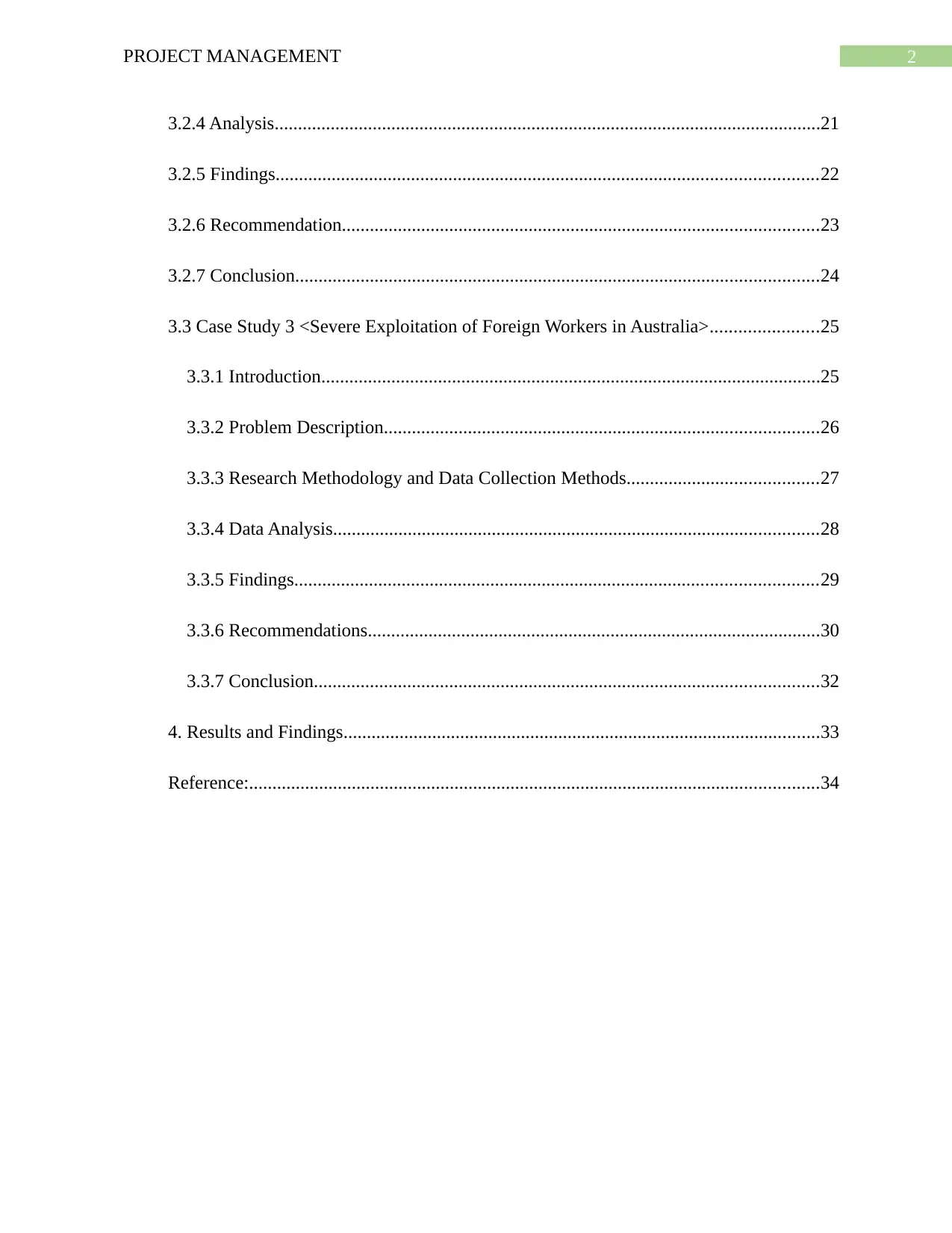
2PROJECT MANAGEMENT
3.2.4 Analysis.....................................................................................................................21
3.2.5 Findings....................................................................................................................22
3.2.6 Recommendation......................................................................................................23
3.2.7 Conclusion................................................................................................................24
3.3 Case Study 3 <Severe Exploitation of Foreign Workers in Australia>.......................25
3.3.1 Introduction...........................................................................................................25
3.3.2 Problem Description.............................................................................................26
3.3.3 Research Methodology and Data Collection Methods.........................................27
3.3.4 Data Analysis........................................................................................................28
3.3.5 Findings................................................................................................................29
3.3.6 Recommendations.................................................................................................30
3.3.7 Conclusion............................................................................................................32
4. Results and Findings......................................................................................................33
Reference:..........................................................................................................................34
3.2.4 Analysis.....................................................................................................................21
3.2.5 Findings....................................................................................................................22
3.2.6 Recommendation......................................................................................................23
3.2.7 Conclusion................................................................................................................24
3.3 Case Study 3 <Severe Exploitation of Foreign Workers in Australia>.......................25
3.3.1 Introduction...........................................................................................................25
3.3.2 Problem Description.............................................................................................26
3.3.3 Research Methodology and Data Collection Methods.........................................27
3.3.4 Data Analysis........................................................................................................28
3.3.5 Findings................................................................................................................29
3.3.6 Recommendations.................................................................................................30
3.3.7 Conclusion............................................................................................................32
4. Results and Findings......................................................................................................33
Reference:..........................................................................................................................34
⊘ This is a preview!⊘
Do you want full access?
Subscribe today to unlock all pages.

Trusted by 1+ million students worldwide
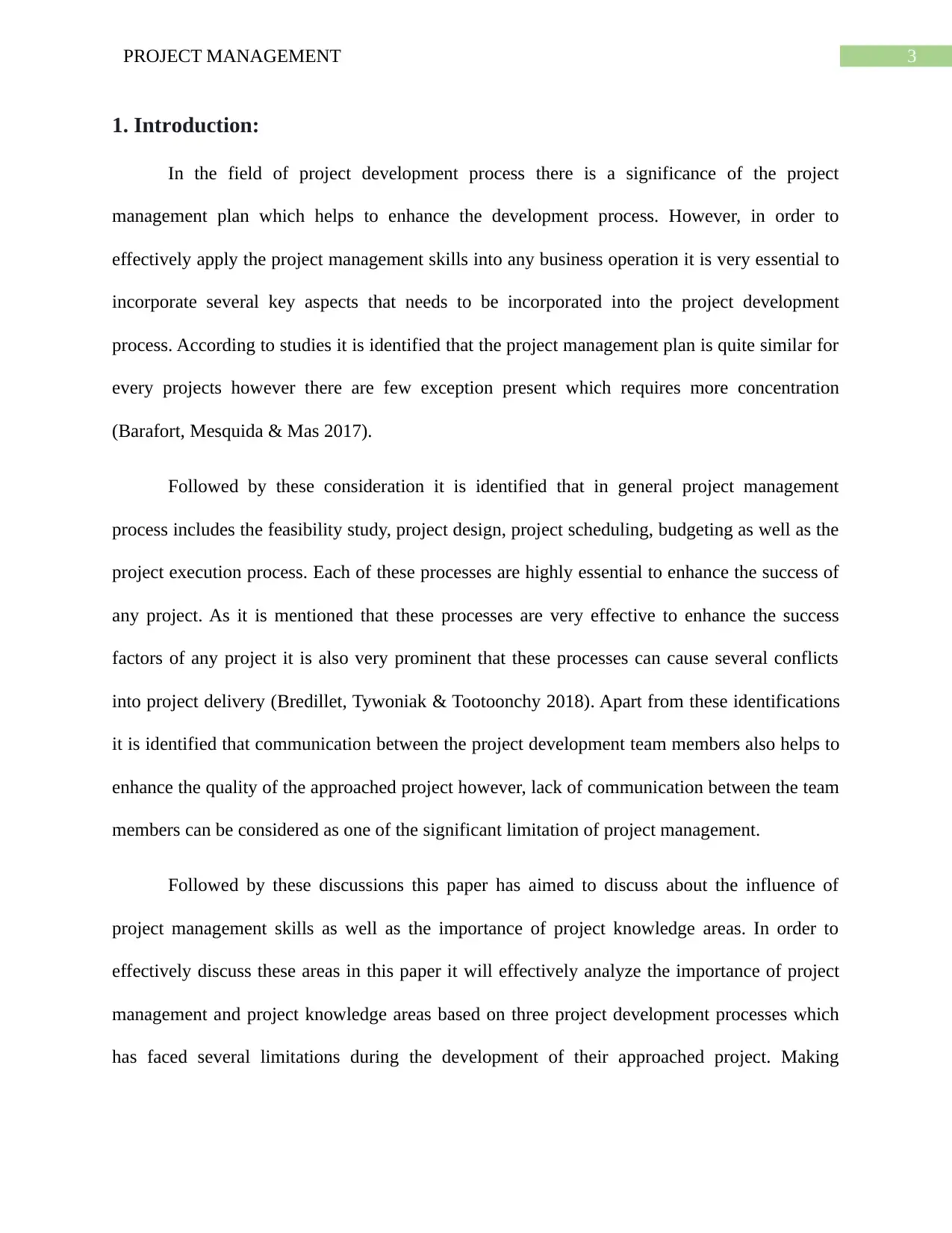
3PROJECT MANAGEMENT
1. Introduction:
In the field of project development process there is a significance of the project
management plan which helps to enhance the development process. However, in order to
effectively apply the project management skills into any business operation it is very essential to
incorporate several key aspects that needs to be incorporated into the project development
process. According to studies it is identified that the project management plan is quite similar for
every projects however there are few exception present which requires more concentration
(Barafort, Mesquida & Mas 2017).
Followed by these consideration it is identified that in general project management
process includes the feasibility study, project design, project scheduling, budgeting as well as the
project execution process. Each of these processes are highly essential to enhance the success of
any project. As it is mentioned that these processes are very effective to enhance the success
factors of any project it is also very prominent that these processes can cause several conflicts
into project delivery (Bredillet, Tywoniak & Tootoonchy 2018). Apart from these identifications
it is identified that communication between the project development team members also helps to
enhance the quality of the approached project however, lack of communication between the team
members can be considered as one of the significant limitation of project management.
Followed by these discussions this paper has aimed to discuss about the influence of
project management skills as well as the importance of project knowledge areas. In order to
effectively discuss these areas in this paper it will effectively analyze the importance of project
management and project knowledge areas based on three project development processes which
has faced several limitations during the development of their approached project. Making
1. Introduction:
In the field of project development process there is a significance of the project
management plan which helps to enhance the development process. However, in order to
effectively apply the project management skills into any business operation it is very essential to
incorporate several key aspects that needs to be incorporated into the project development
process. According to studies it is identified that the project management plan is quite similar for
every projects however there are few exception present which requires more concentration
(Barafort, Mesquida & Mas 2017).
Followed by these consideration it is identified that in general project management
process includes the feasibility study, project design, project scheduling, budgeting as well as the
project execution process. Each of these processes are highly essential to enhance the success of
any project. As it is mentioned that these processes are very effective to enhance the success
factors of any project it is also very prominent that these processes can cause several conflicts
into project delivery (Bredillet, Tywoniak & Tootoonchy 2018). Apart from these identifications
it is identified that communication between the project development team members also helps to
enhance the quality of the approached project however, lack of communication between the team
members can be considered as one of the significant limitation of project management.
Followed by these discussions this paper has aimed to discuss about the influence of
project management skills as well as the importance of project knowledge areas. In order to
effectively discuss these areas in this paper it will effectively analyze the importance of project
management and project knowledge areas based on three project development processes which
has faced several limitations during the development of their approached project. Making
Paraphrase This Document
Need a fresh take? Get an instant paraphrase of this document with our AI Paraphraser
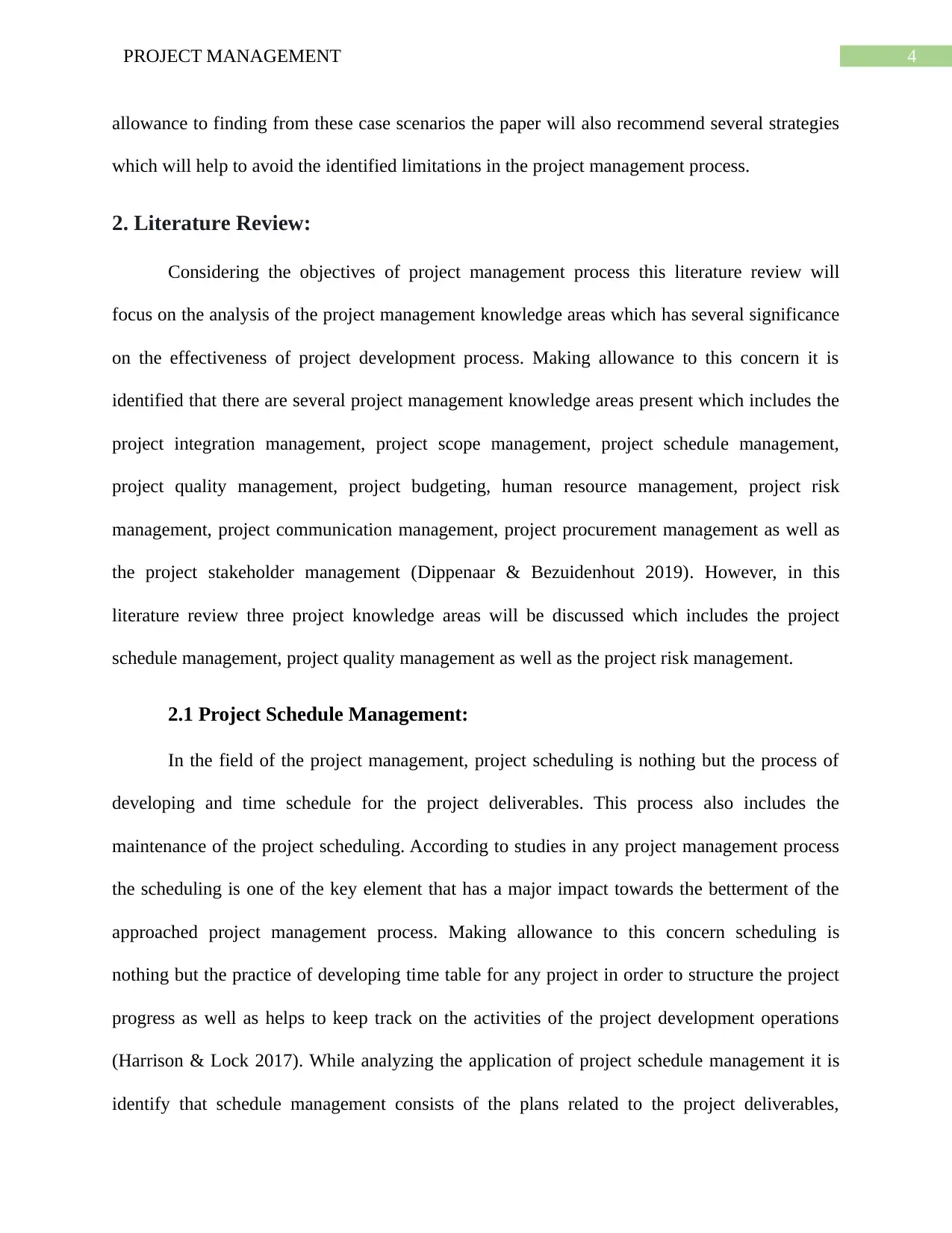
4PROJECT MANAGEMENT
allowance to finding from these case scenarios the paper will also recommend several strategies
which will help to avoid the identified limitations in the project management process.
2. Literature Review:
Considering the objectives of project management process this literature review will
focus on the analysis of the project management knowledge areas which has several significance
on the effectiveness of project development process. Making allowance to this concern it is
identified that there are several project management knowledge areas present which includes the
project integration management, project scope management, project schedule management,
project quality management, project budgeting, human resource management, project risk
management, project communication management, project procurement management as well as
the project stakeholder management (Dippenaar & Bezuidenhout 2019). However, in this
literature review three project knowledge areas will be discussed which includes the project
schedule management, project quality management as well as the project risk management.
2.1 Project Schedule Management:
In the field of the project management, project scheduling is nothing but the process of
developing and time schedule for the project deliverables. This process also includes the
maintenance of the project scheduling. According to studies in any project management process
the scheduling is one of the key element that has a major impact towards the betterment of the
approached project management process. Making allowance to this concern scheduling is
nothing but the practice of developing time table for any project in order to structure the project
progress as well as helps to keep track on the activities of the project development operations
(Harrison & Lock 2017). While analyzing the application of project schedule management it is
identify that schedule management consists of the plans related to the project deliverables,
allowance to finding from these case scenarios the paper will also recommend several strategies
which will help to avoid the identified limitations in the project management process.
2. Literature Review:
Considering the objectives of project management process this literature review will
focus on the analysis of the project management knowledge areas which has several significance
on the effectiveness of project development process. Making allowance to this concern it is
identified that there are several project management knowledge areas present which includes the
project integration management, project scope management, project schedule management,
project quality management, project budgeting, human resource management, project risk
management, project communication management, project procurement management as well as
the project stakeholder management (Dippenaar & Bezuidenhout 2019). However, in this
literature review three project knowledge areas will be discussed which includes the project
schedule management, project quality management as well as the project risk management.
2.1 Project Schedule Management:
In the field of the project management, project scheduling is nothing but the process of
developing and time schedule for the project deliverables. This process also includes the
maintenance of the project scheduling. According to studies in any project management process
the scheduling is one of the key element that has a major impact towards the betterment of the
approached project management process. Making allowance to this concern scheduling is
nothing but the practice of developing time table for any project in order to structure the project
progress as well as helps to keep track on the activities of the project development operations
(Harrison & Lock 2017). While analyzing the application of project schedule management it is
identify that schedule management consists of the plans related to the project deliverables,
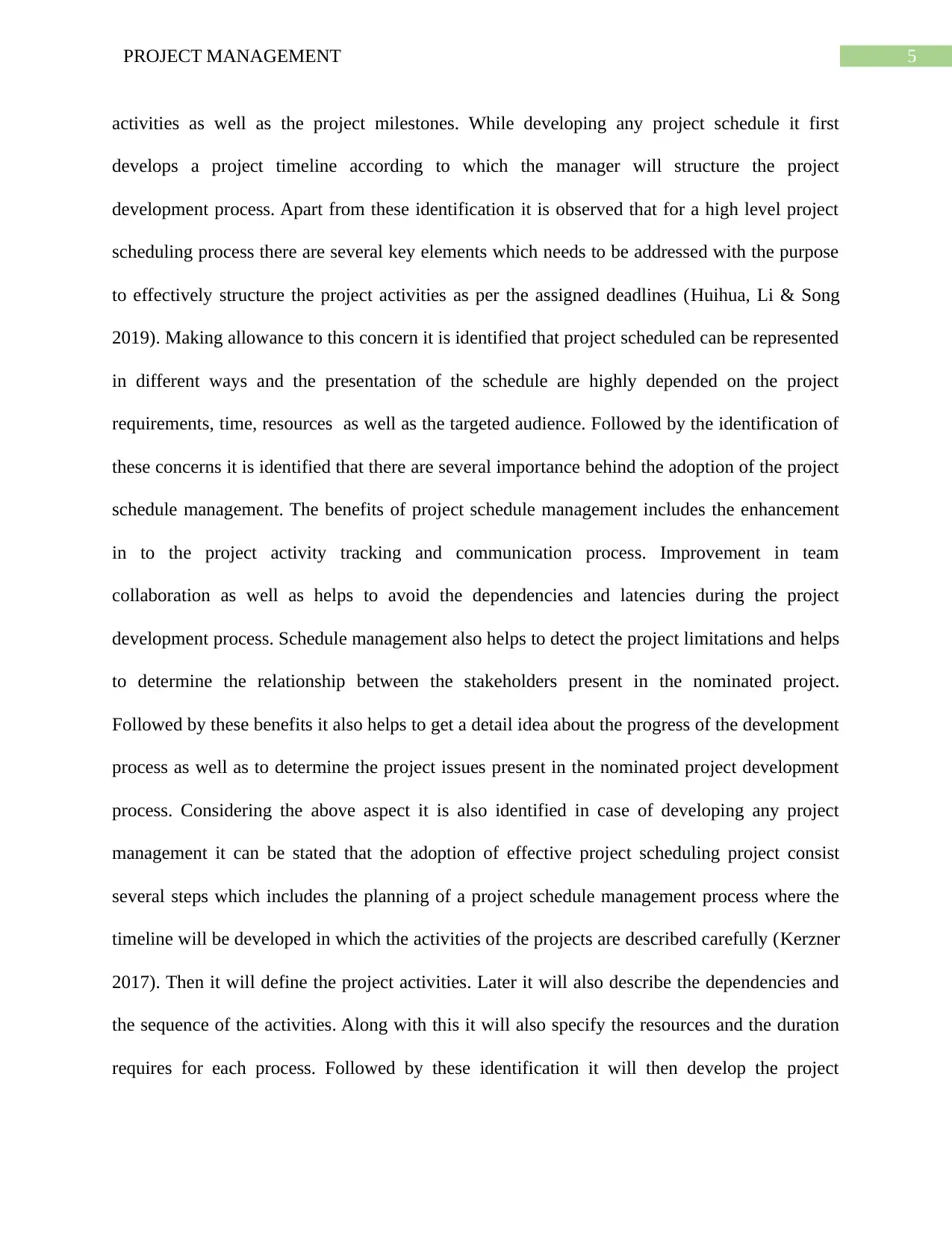
5PROJECT MANAGEMENT
activities as well as the project milestones. While developing any project schedule it first
develops a project timeline according to which the manager will structure the project
development process. Apart from these identification it is observed that for a high level project
scheduling process there are several key elements which needs to be addressed with the purpose
to effectively structure the project activities as per the assigned deadlines (Huihua, Li & Song
2019). Making allowance to this concern it is identified that project scheduled can be represented
in different ways and the presentation of the schedule are highly depended on the project
requirements, time, resources as well as the targeted audience. Followed by the identification of
these concerns it is identified that there are several importance behind the adoption of the project
schedule management. The benefits of project schedule management includes the enhancement
in to the project activity tracking and communication process. Improvement in team
collaboration as well as helps to avoid the dependencies and latencies during the project
development process. Schedule management also helps to detect the project limitations and helps
to determine the relationship between the stakeholders present in the nominated project.
Followed by these benefits it also helps to get a detail idea about the progress of the development
process as well as to determine the project issues present in the nominated project development
process. Considering the above aspect it is also identified in case of developing any project
management it can be stated that the adoption of effective project scheduling project consist
several steps which includes the planning of a project schedule management process where the
timeline will be developed in which the activities of the projects are described carefully (Kerzner
2017). Then it will define the project activities. Later it will also describe the dependencies and
the sequence of the activities. Along with this it will also specify the resources and the duration
requires for each process. Followed by these identification it will then develop the project
activities as well as the project milestones. While developing any project schedule it first
develops a project timeline according to which the manager will structure the project
development process. Apart from these identification it is observed that for a high level project
scheduling process there are several key elements which needs to be addressed with the purpose
to effectively structure the project activities as per the assigned deadlines (Huihua, Li & Song
2019). Making allowance to this concern it is identified that project scheduled can be represented
in different ways and the presentation of the schedule are highly depended on the project
requirements, time, resources as well as the targeted audience. Followed by the identification of
these concerns it is identified that there are several importance behind the adoption of the project
schedule management. The benefits of project schedule management includes the enhancement
in to the project activity tracking and communication process. Improvement in team
collaboration as well as helps to avoid the dependencies and latencies during the project
development process. Schedule management also helps to detect the project limitations and helps
to determine the relationship between the stakeholders present in the nominated project.
Followed by these benefits it also helps to get a detail idea about the progress of the development
process as well as to determine the project issues present in the nominated project development
process. Considering the above aspect it is also identified in case of developing any project
management it can be stated that the adoption of effective project scheduling project consist
several steps which includes the planning of a project schedule management process where the
timeline will be developed in which the activities of the projects are described carefully (Kerzner
2017). Then it will define the project activities. Later it will also describe the dependencies and
the sequence of the activities. Along with this it will also specify the resources and the duration
requires for each process. Followed by these identification it will then develop the project
⊘ This is a preview!⊘
Do you want full access?
Subscribe today to unlock all pages.

Trusted by 1+ million students worldwide
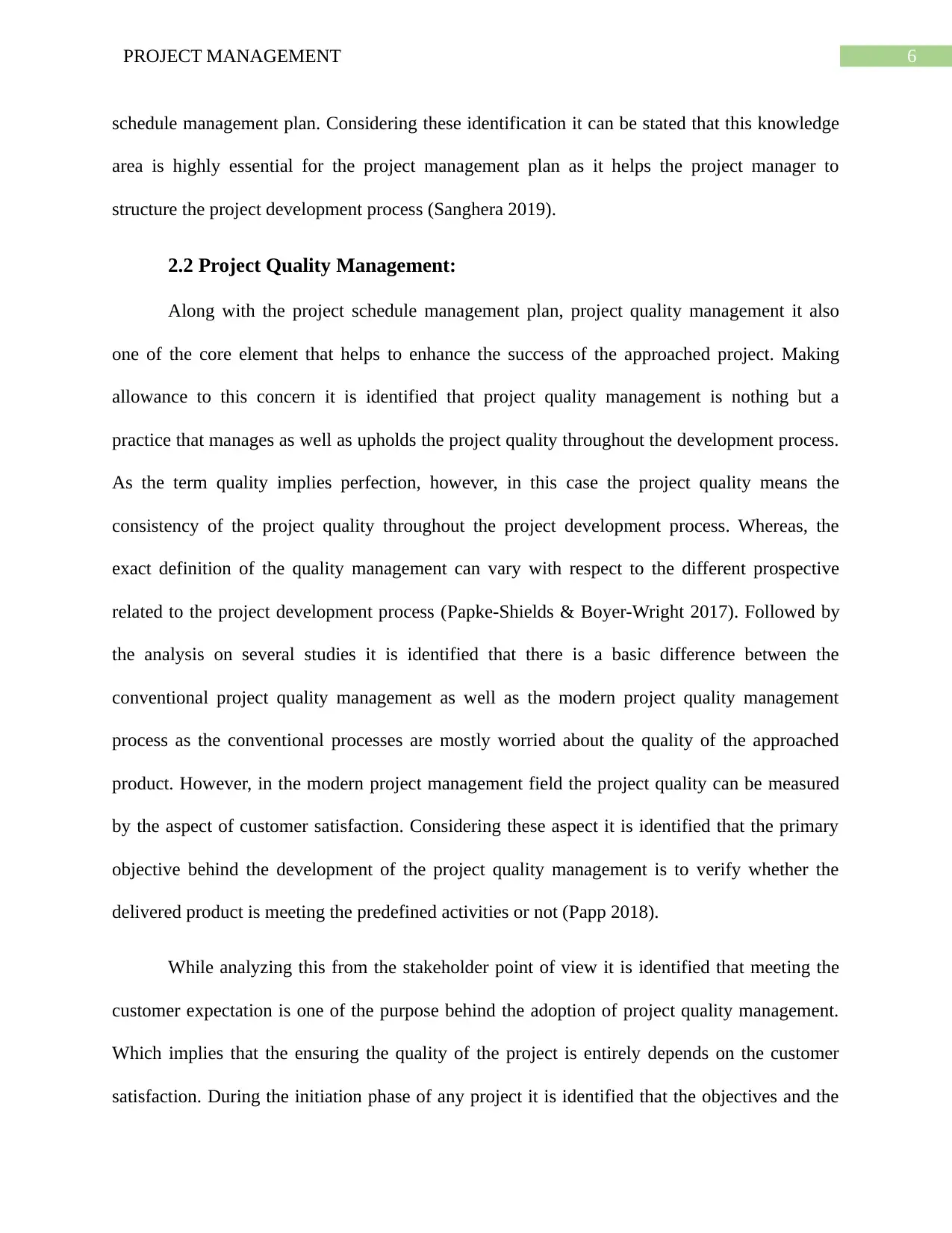
6PROJECT MANAGEMENT
schedule management plan. Considering these identification it can be stated that this knowledge
area is highly essential for the project management plan as it helps the project manager to
structure the project development process (Sanghera 2019).
2.2 Project Quality Management:
Along with the project schedule management plan, project quality management it also
one of the core element that helps to enhance the success of the approached project. Making
allowance to this concern it is identified that project quality management is nothing but a
practice that manages as well as upholds the project quality throughout the development process.
As the term quality implies perfection, however, in this case the project quality means the
consistency of the project quality throughout the project development process. Whereas, the
exact definition of the quality management can vary with respect to the different prospective
related to the project development process (Papke-Shields & Boyer-Wright 2017). Followed by
the analysis on several studies it is identified that there is a basic difference between the
conventional project quality management as well as the modern project quality management
process as the conventional processes are mostly worried about the quality of the approached
product. However, in the modern project management field the project quality can be measured
by the aspect of customer satisfaction. Considering these aspect it is identified that the primary
objective behind the development of the project quality management is to verify whether the
delivered product is meeting the predefined activities or not (Papp 2018).
While analyzing this from the stakeholder point of view it is identified that meeting the
customer expectation is one of the purpose behind the adoption of project quality management.
Which implies that the ensuring the quality of the project is entirely depends on the customer
satisfaction. During the initiation phase of any project it is identified that the objectives and the
schedule management plan. Considering these identification it can be stated that this knowledge
area is highly essential for the project management plan as it helps the project manager to
structure the project development process (Sanghera 2019).
2.2 Project Quality Management:
Along with the project schedule management plan, project quality management it also
one of the core element that helps to enhance the success of the approached project. Making
allowance to this concern it is identified that project quality management is nothing but a
practice that manages as well as upholds the project quality throughout the development process.
As the term quality implies perfection, however, in this case the project quality means the
consistency of the project quality throughout the project development process. Whereas, the
exact definition of the quality management can vary with respect to the different prospective
related to the project development process (Papke-Shields & Boyer-Wright 2017). Followed by
the analysis on several studies it is identified that there is a basic difference between the
conventional project quality management as well as the modern project quality management
process as the conventional processes are mostly worried about the quality of the approached
product. However, in the modern project management field the project quality can be measured
by the aspect of customer satisfaction. Considering these aspect it is identified that the primary
objective behind the development of the project quality management is to verify whether the
delivered product is meeting the predefined activities or not (Papp 2018).
While analyzing this from the stakeholder point of view it is identified that meeting the
customer expectation is one of the purpose behind the adoption of project quality management.
Which implies that the ensuring the quality of the project is entirely depends on the customer
satisfaction. During the initiation phase of any project it is identified that the objectives and the
Paraphrase This Document
Need a fresh take? Get an instant paraphrase of this document with our AI Paraphraser
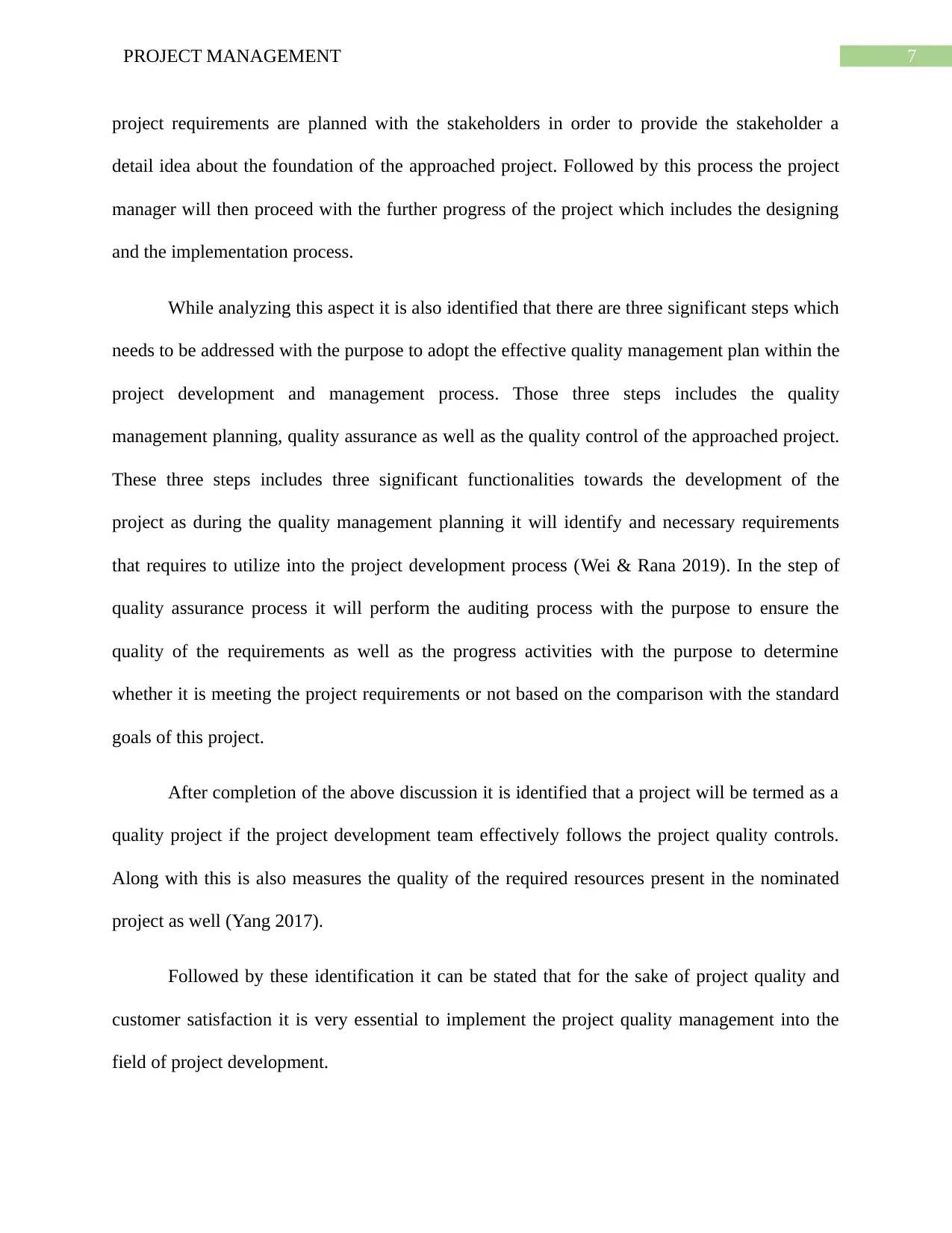
7PROJECT MANAGEMENT
project requirements are planned with the stakeholders in order to provide the stakeholder a
detail idea about the foundation of the approached project. Followed by this process the project
manager will then proceed with the further progress of the project which includes the designing
and the implementation process.
While analyzing this aspect it is also identified that there are three significant steps which
needs to be addressed with the purpose to adopt the effective quality management plan within the
project development and management process. Those three steps includes the quality
management planning, quality assurance as well as the quality control of the approached project.
These three steps includes three significant functionalities towards the development of the
project as during the quality management planning it will identify and necessary requirements
that requires to utilize into the project development process (Wei & Rana 2019). In the step of
quality assurance process it will perform the auditing process with the purpose to ensure the
quality of the requirements as well as the progress activities with the purpose to determine
whether it is meeting the project requirements or not based on the comparison with the standard
goals of this project.
After completion of the above discussion it is identified that a project will be termed as a
quality project if the project development team effectively follows the project quality controls.
Along with this is also measures the quality of the required resources present in the nominated
project as well (Yang 2017).
Followed by these identification it can be stated that for the sake of project quality and
customer satisfaction it is very essential to implement the project quality management into the
field of project development.
project requirements are planned with the stakeholders in order to provide the stakeholder a
detail idea about the foundation of the approached project. Followed by this process the project
manager will then proceed with the further progress of the project which includes the designing
and the implementation process.
While analyzing this aspect it is also identified that there are three significant steps which
needs to be addressed with the purpose to adopt the effective quality management plan within the
project development and management process. Those three steps includes the quality
management planning, quality assurance as well as the quality control of the approached project.
These three steps includes three significant functionalities towards the development of the
project as during the quality management planning it will identify and necessary requirements
that requires to utilize into the project development process (Wei & Rana 2019). In the step of
quality assurance process it will perform the auditing process with the purpose to ensure the
quality of the requirements as well as the progress activities with the purpose to determine
whether it is meeting the project requirements or not based on the comparison with the standard
goals of this project.
After completion of the above discussion it is identified that a project will be termed as a
quality project if the project development team effectively follows the project quality controls.
Along with this is also measures the quality of the required resources present in the nominated
project as well (Yang 2017).
Followed by these identification it can be stated that for the sake of project quality and
customer satisfaction it is very essential to implement the project quality management into the
field of project development.
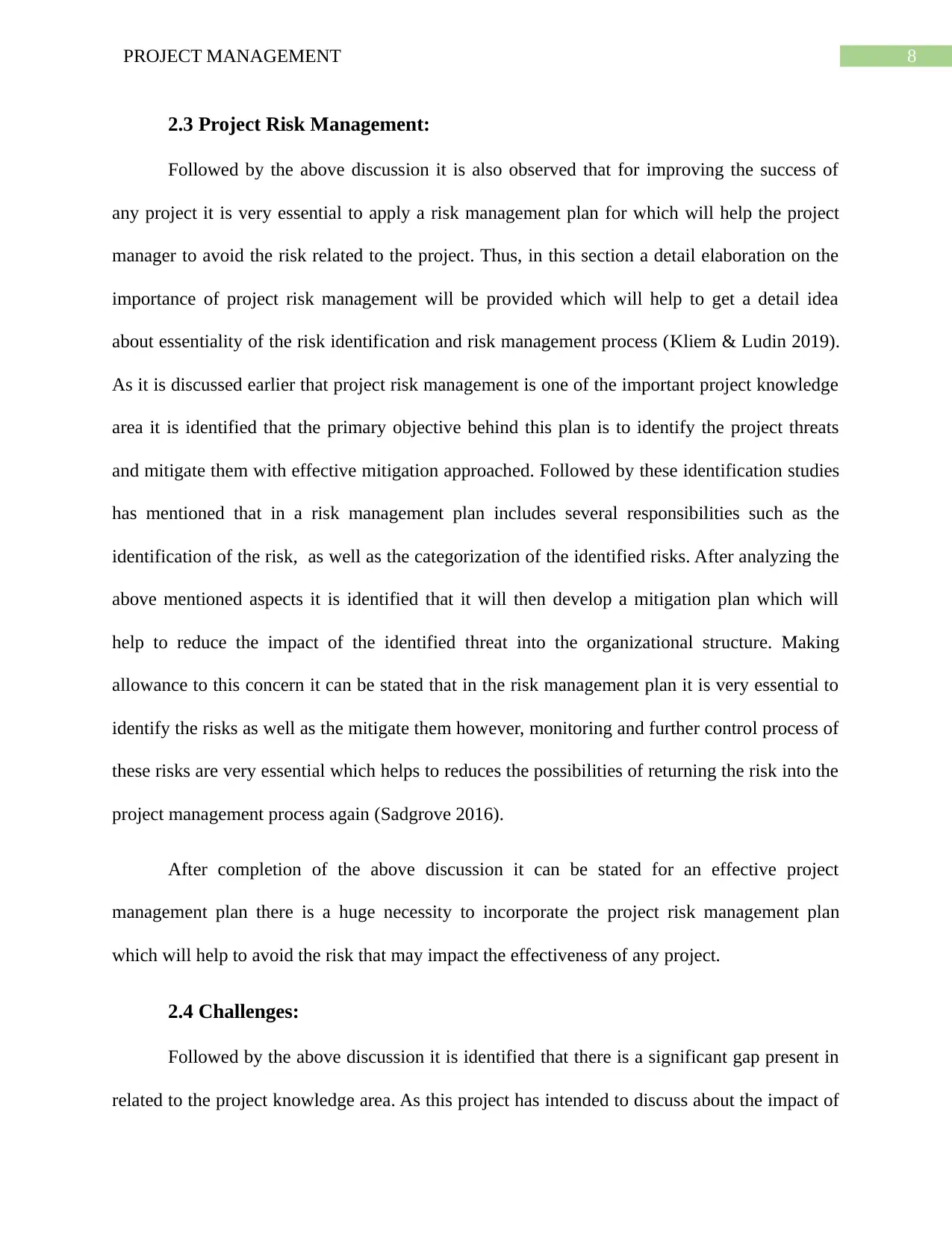
8PROJECT MANAGEMENT
2.3 Project Risk Management:
Followed by the above discussion it is also observed that for improving the success of
any project it is very essential to apply a risk management plan for which will help the project
manager to avoid the risk related to the project. Thus, in this section a detail elaboration on the
importance of project risk management will be provided which will help to get a detail idea
about essentiality of the risk identification and risk management process (Kliem & Ludin 2019).
As it is discussed earlier that project risk management is one of the important project knowledge
area it is identified that the primary objective behind this plan is to identify the project threats
and mitigate them with effective mitigation approached. Followed by these identification studies
has mentioned that in a risk management plan includes several responsibilities such as the
identification of the risk, as well as the categorization of the identified risks. After analyzing the
above mentioned aspects it is identified that it will then develop a mitigation plan which will
help to reduce the impact of the identified threat into the organizational structure. Making
allowance to this concern it can be stated that in the risk management plan it is very essential to
identify the risks as well as the mitigate them however, monitoring and further control process of
these risks are very essential which helps to reduces the possibilities of returning the risk into the
project management process again (Sadgrove 2016).
After completion of the above discussion it can be stated for an effective project
management plan there is a huge necessity to incorporate the project risk management plan
which will help to avoid the risk that may impact the effectiveness of any project.
2.4 Challenges:
Followed by the above discussion it is identified that there is a significant gap present in
related to the project knowledge area. As this project has intended to discuss about the impact of
2.3 Project Risk Management:
Followed by the above discussion it is also observed that for improving the success of
any project it is very essential to apply a risk management plan for which will help the project
manager to avoid the risk related to the project. Thus, in this section a detail elaboration on the
importance of project risk management will be provided which will help to get a detail idea
about essentiality of the risk identification and risk management process (Kliem & Ludin 2019).
As it is discussed earlier that project risk management is one of the important project knowledge
area it is identified that the primary objective behind this plan is to identify the project threats
and mitigate them with effective mitigation approached. Followed by these identification studies
has mentioned that in a risk management plan includes several responsibilities such as the
identification of the risk, as well as the categorization of the identified risks. After analyzing the
above mentioned aspects it is identified that it will then develop a mitigation plan which will
help to reduce the impact of the identified threat into the organizational structure. Making
allowance to this concern it can be stated that in the risk management plan it is very essential to
identify the risks as well as the mitigate them however, monitoring and further control process of
these risks are very essential which helps to reduces the possibilities of returning the risk into the
project management process again (Sadgrove 2016).
After completion of the above discussion it can be stated for an effective project
management plan there is a huge necessity to incorporate the project risk management plan
which will help to avoid the risk that may impact the effectiveness of any project.
2.4 Challenges:
Followed by the above discussion it is identified that there is a significant gap present in
related to the project knowledge area. As this project has intended to discuss about the impact of
⊘ This is a preview!⊘
Do you want full access?
Subscribe today to unlock all pages.

Trusted by 1+ million students worldwide
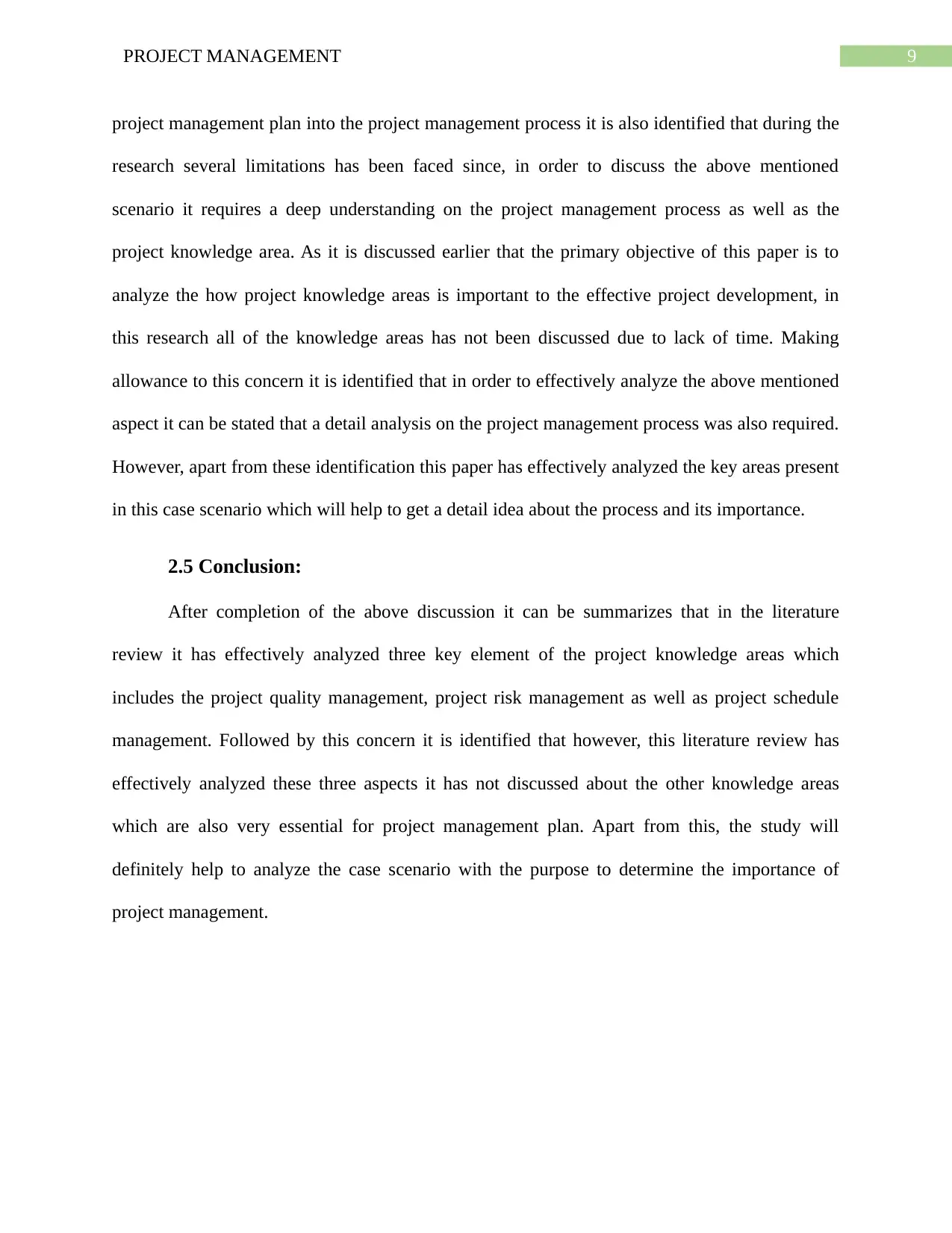
9PROJECT MANAGEMENT
project management plan into the project management process it is also identified that during the
research several limitations has been faced since, in order to discuss the above mentioned
scenario it requires a deep understanding on the project management process as well as the
project knowledge area. As it is discussed earlier that the primary objective of this paper is to
analyze the how project knowledge areas is important to the effective project development, in
this research all of the knowledge areas has not been discussed due to lack of time. Making
allowance to this concern it is identified that in order to effectively analyze the above mentioned
aspect it can be stated that a detail analysis on the project management process was also required.
However, apart from these identification this paper has effectively analyzed the key areas present
in this case scenario which will help to get a detail idea about the process and its importance.
2.5 Conclusion:
After completion of the above discussion it can be summarizes that in the literature
review it has effectively analyzed three key element of the project knowledge areas which
includes the project quality management, project risk management as well as project schedule
management. Followed by this concern it is identified that however, this literature review has
effectively analyzed these three aspects it has not discussed about the other knowledge areas
which are also very essential for project management plan. Apart from this, the study will
definitely help to analyze the case scenario with the purpose to determine the importance of
project management.
project management plan into the project management process it is also identified that during the
research several limitations has been faced since, in order to discuss the above mentioned
scenario it requires a deep understanding on the project management process as well as the
project knowledge area. As it is discussed earlier that the primary objective of this paper is to
analyze the how project knowledge areas is important to the effective project development, in
this research all of the knowledge areas has not been discussed due to lack of time. Making
allowance to this concern it is identified that in order to effectively analyze the above mentioned
aspect it can be stated that a detail analysis on the project management process was also required.
However, apart from these identification this paper has effectively analyzed the key areas present
in this case scenario which will help to get a detail idea about the process and its importance.
2.5 Conclusion:
After completion of the above discussion it can be summarizes that in the literature
review it has effectively analyzed three key element of the project knowledge areas which
includes the project quality management, project risk management as well as project schedule
management. Followed by this concern it is identified that however, this literature review has
effectively analyzed these three aspects it has not discussed about the other knowledge areas
which are also very essential for project management plan. Apart from this, the study will
definitely help to analyze the case scenario with the purpose to determine the importance of
project management.
Paraphrase This Document
Need a fresh take? Get an instant paraphrase of this document with our AI Paraphraser
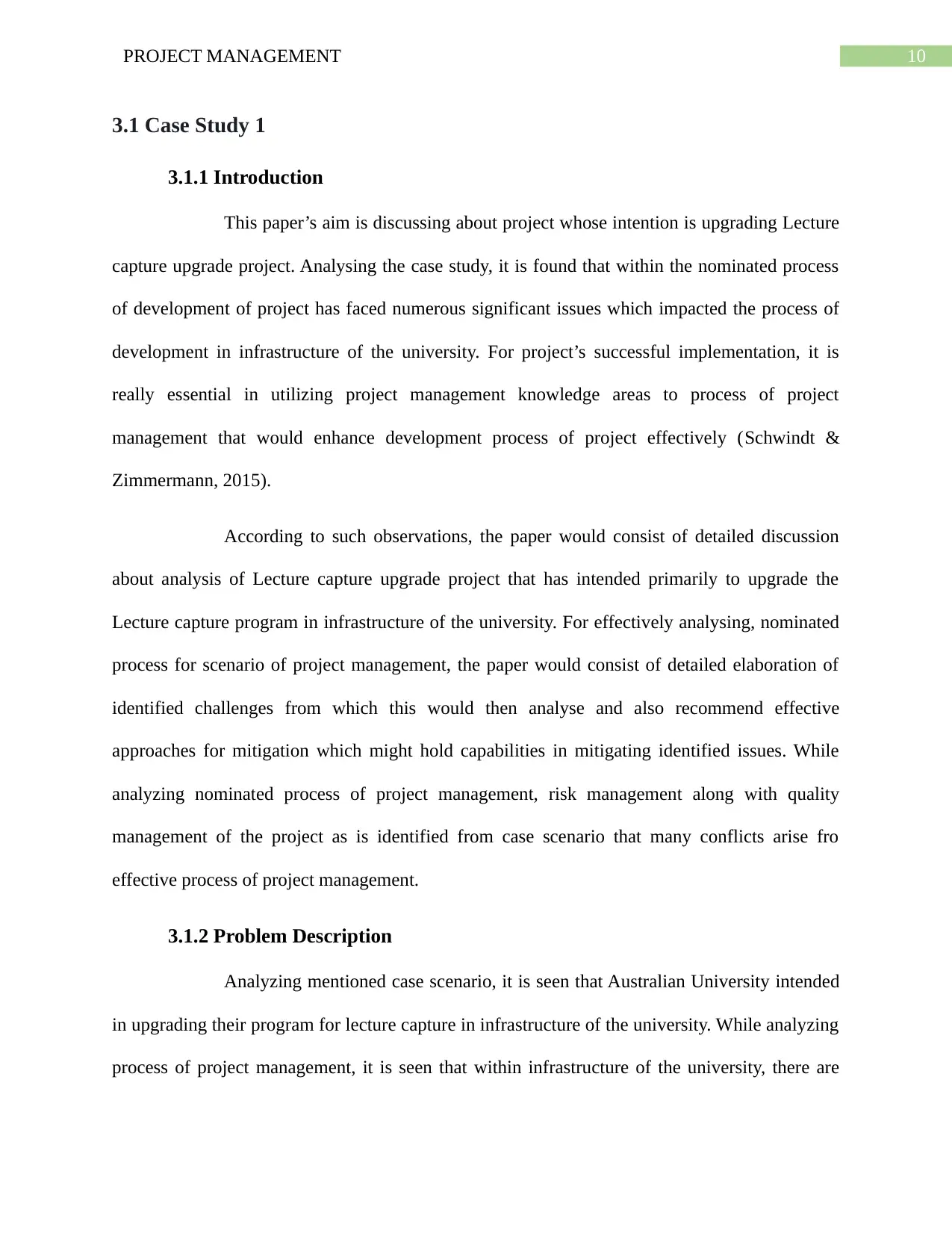
10PROJECT MANAGEMENT
3.1 Case Study 1
3.1.1 Introduction
This paper’s aim is discussing about project whose intention is upgrading Lecture
capture upgrade project. Analysing the case study, it is found that within the nominated process
of development of project has faced numerous significant issues which impacted the process of
development in infrastructure of the university. For project’s successful implementation, it is
really essential in utilizing project management knowledge areas to process of project
management that would enhance development process of project effectively (Schwindt &
Zimmermann, 2015).
According to such observations, the paper would consist of detailed discussion
about analysis of Lecture capture upgrade project that has intended primarily to upgrade the
Lecture capture program in infrastructure of the university. For effectively analysing, nominated
process for scenario of project management, the paper would consist of detailed elaboration of
identified challenges from which this would then analyse and also recommend effective
approaches for mitigation which might hold capabilities in mitigating identified issues. While
analyzing nominated process of project management, risk management along with quality
management of the project as is identified from case scenario that many conflicts arise fro
effective process of project management.
3.1.2 Problem Description
Analyzing mentioned case scenario, it is seen that Australian University intended
in upgrading their program for lecture capture in infrastructure of the university. While analyzing
process of project management, it is seen that within infrastructure of the university, there are
3.1 Case Study 1
3.1.1 Introduction
This paper’s aim is discussing about project whose intention is upgrading Lecture
capture upgrade project. Analysing the case study, it is found that within the nominated process
of development of project has faced numerous significant issues which impacted the process of
development in infrastructure of the university. For project’s successful implementation, it is
really essential in utilizing project management knowledge areas to process of project
management that would enhance development process of project effectively (Schwindt &
Zimmermann, 2015).
According to such observations, the paper would consist of detailed discussion
about analysis of Lecture capture upgrade project that has intended primarily to upgrade the
Lecture capture program in infrastructure of the university. For effectively analysing, nominated
process for scenario of project management, the paper would consist of detailed elaboration of
identified challenges from which this would then analyse and also recommend effective
approaches for mitigation which might hold capabilities in mitigating identified issues. While
analyzing nominated process of project management, risk management along with quality
management of the project as is identified from case scenario that many conflicts arise fro
effective process of project management.
3.1.2 Problem Description
Analyzing mentioned case scenario, it is seen that Australian University intended
in upgrading their program for lecture capture in infrastructure of the university. While analyzing
process of project management, it is seen that within infrastructure of the university, there are
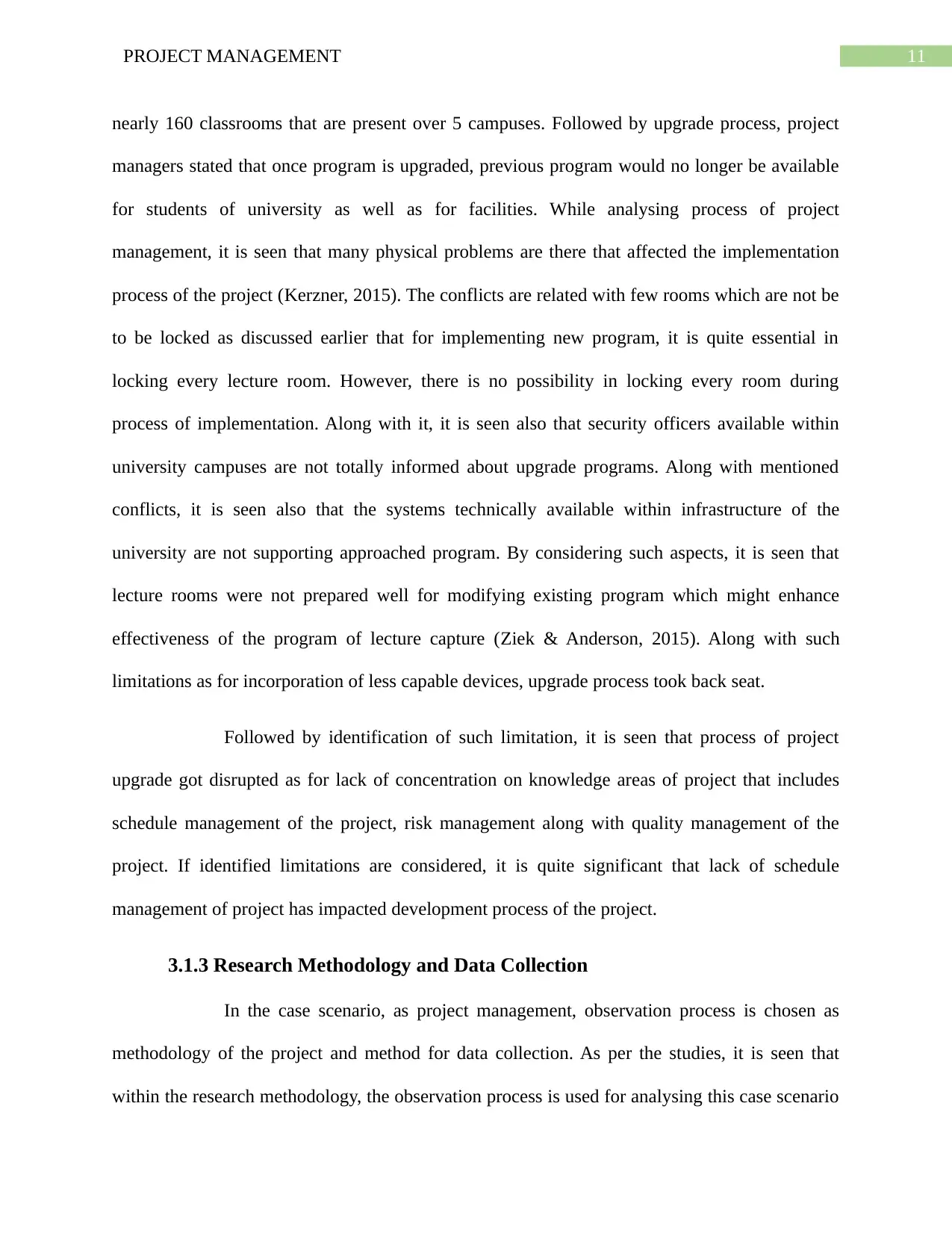
11PROJECT MANAGEMENT
nearly 160 classrooms that are present over 5 campuses. Followed by upgrade process, project
managers stated that once program is upgraded, previous program would no longer be available
for students of university as well as for facilities. While analysing process of project
management, it is seen that many physical problems are there that affected the implementation
process of the project (Kerzner, 2015). The conflicts are related with few rooms which are not be
to be locked as discussed earlier that for implementing new program, it is quite essential in
locking every lecture room. However, there is no possibility in locking every room during
process of implementation. Along with it, it is seen also that security officers available within
university campuses are not totally informed about upgrade programs. Along with mentioned
conflicts, it is seen also that the systems technically available within infrastructure of the
university are not supporting approached program. By considering such aspects, it is seen that
lecture rooms were not prepared well for modifying existing program which might enhance
effectiveness of the program of lecture capture (Ziek & Anderson, 2015). Along with such
limitations as for incorporation of less capable devices, upgrade process took back seat.
Followed by identification of such limitation, it is seen that process of project
upgrade got disrupted as for lack of concentration on knowledge areas of project that includes
schedule management of the project, risk management along with quality management of the
project. If identified limitations are considered, it is quite significant that lack of schedule
management of project has impacted development process of the project.
3.1.3 Research Methodology and Data Collection
In the case scenario, as project management, observation process is chosen as
methodology of the project and method for data collection. As per the studies, it is seen that
within the research methodology, the observation process is used for analysing this case scenario
nearly 160 classrooms that are present over 5 campuses. Followed by upgrade process, project
managers stated that once program is upgraded, previous program would no longer be available
for students of university as well as for facilities. While analysing process of project
management, it is seen that many physical problems are there that affected the implementation
process of the project (Kerzner, 2015). The conflicts are related with few rooms which are not be
to be locked as discussed earlier that for implementing new program, it is quite essential in
locking every lecture room. However, there is no possibility in locking every room during
process of implementation. Along with it, it is seen also that security officers available within
university campuses are not totally informed about upgrade programs. Along with mentioned
conflicts, it is seen also that the systems technically available within infrastructure of the
university are not supporting approached program. By considering such aspects, it is seen that
lecture rooms were not prepared well for modifying existing program which might enhance
effectiveness of the program of lecture capture (Ziek & Anderson, 2015). Along with such
limitations as for incorporation of less capable devices, upgrade process took back seat.
Followed by identification of such limitation, it is seen that process of project
upgrade got disrupted as for lack of concentration on knowledge areas of project that includes
schedule management of the project, risk management along with quality management of the
project. If identified limitations are considered, it is quite significant that lack of schedule
management of project has impacted development process of the project.
3.1.3 Research Methodology and Data Collection
In the case scenario, as project management, observation process is chosen as
methodology of the project and method for data collection. As per the studies, it is seen that
within the research methodology, the observation process is used for analysing this case scenario
⊘ This is a preview!⊘
Do you want full access?
Subscribe today to unlock all pages.

Trusted by 1+ million students worldwide
1 out of 40
Related Documents
Your All-in-One AI-Powered Toolkit for Academic Success.
+13062052269
info@desklib.com
Available 24*7 on WhatsApp / Email
![[object Object]](/_next/static/media/star-bottom.7253800d.svg)
Unlock your academic potential
Copyright © 2020–2026 A2Z Services. All Rights Reserved. Developed and managed by ZUCOL.




